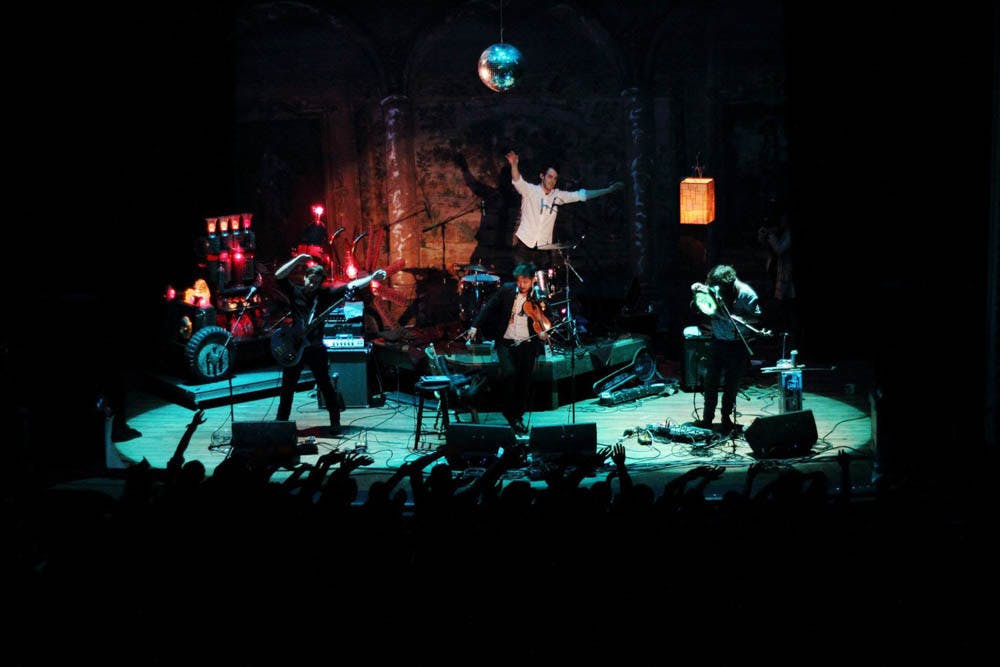Providence band Low Anthem’s Jeff Prystowsky ’06 had just sat down for a slice of pizza when he noticed an interesting-looking building through the window. Curious, he went up to the door and sleuthed around to find its owner. After some calls around town, Prystowsky found the building’s owner, John Berberian PhD’68 P’93 P’97, who offered to give him a tour. He learned that he had not happened upon just any old building: 270 Broadway had a story.
Berberian had owned the Columbus Theater since the 1960s, working to maintain the building, which still housed equipment from when it opened in the 1920s. Throughout its long history, the theater had accumulated evidence of multiple decades of performances — ranging from opera to porn. It was like “walking into a timewarp,” said Ben Knox Miller ’06, Prystowsky’s friend and bandmate and a Columbus Theater co-op member.
When the members of Low Anthem met Berberian five years ago, they had been storing their equipment in an attic, Miller said. The band needed a new space for storage and to record their latest album, “Eyeland.” They thought the inoperative theater would work perfectly — besides, it had “the best acoustics in Providence,” Miller added.
New Rhode Island fire regulations put in place after the Station nightclub fire in 2003 had forced Berberian to shut down the Columbus for three years. When approached by the members of Low Anthem, Berberian offered to make the necessary investment for the license if the band would run the theater and plan a benefit show to raise money. Low Anthem rallied with local bands and got members of Providence’s music community involved to raise money for the both the theater and Atraves, a Providence-based nonprofit working for education, health and development in Nicaragua. During the process, they found more volunteers and formed the foundations of a music co-op.
The roles for each member came naturally, Prystowsky said, describing the consensus-based process of managing the bar, doing community outreach and working on overall planning. Because of the background many of the co-op members have in music, they have a way of “just being in touch with the artist experience.” Prystowsky noted that when John C. Reilly, known for his role in movies such as “Step Brothers,” “Wreck it Ralph” and “Guardians of the Galaxy,” performed at the theater, he compared the Columbus to “inmates running the asylum.”
“I think the thing that sets us apart is having musicians involved in the operation,” said Tom Weyman, a co-op member with a background in management. “There’s a level of understanding when a band comes to the theater.”
“The theater means a lot to us. It’s a special place — a lot of historic theaters tend to … get snatched up by a giant company and turned into something else. We want to keep it special,” Weyman said.
The co-op manages without corporate involvement, Prystowsky said. Since 2011, they have put on about 400 shows, in addition to growing as a community resource with student internships and music lessons.
Prystowsky, who studied American history and music in his time at Brown, sees the theater as a bridge, creating a space to apply his theoretical studies at Brown to a practical and political platform. “If you put on a show with a political tinge, you might get protestors and you might get people who are supportive,” he said. Last Sunday, Native American singer-songwriter Buffy Sainte-Marie played at the Columbus, bringing the “No DAPL” movement to center stage.
“If you dream it, you can make it come true,” Prystowsky said, describing the five-year endeavor that started with a slice of pizza. “It should have become a … parking lot. If you have people who care about it, put their heart in it, things have a chance to live on.”





